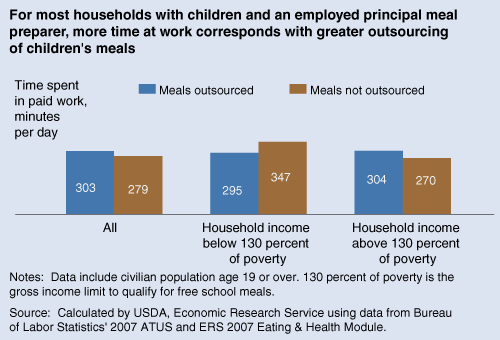Working Parents Outsource Children’s Meals
- by Joanne Guthrie and Ket McClelland
- 3/1/2009
Virtually all households take the dollar cost of food into account when making food choices. But for some households, the time involved in planning, shopping for, and preparing a meal is also an important consideration. Findings from the Eating & Health Module of the American Time Use Survey (ATUS) indicate that many working parents free up time by “outsourcing” their children’s meals—that is, they purchase prepared meals for their children at school or day care.
In 2007, principal meal preparers in households with individuals younger than age 19 were asked whether any of the children or youths ate a breakfast and/or lunch prepared at a school, a paid day care or Head Start center, or a summer day program in the week before the survey interview day. Having their children eat meals prepared at school or day care can save households time otherwise spent preparing and packing meals at home. Time savings may be valuable to households with principal meal preparers employed in paid work, especially the more hours they work. ATUS data indicate that employed meal preparers who took advantage of prepared meals at school or day care spent more time in paid work (303 minutes per day, or 5 hours) than those who did not (279 minutes, or 4.6 hours).
This result held across most income levels, except for households at the lowest income level. Among households with incomes qualifying them for free meals, employed people who prepared meals and who did not obtain meals for their children from school or day care worked longer hours (347 minutes, or 5.8 hours) than those whose did obtain meals (295 minutes, or 4.9 hours). The reverse was true for higher income groups.
Why are low-income families who work more hours less likely to obtain school or day care meals for their children? One possibility is that the low-income households in the survey were more likely to have children ages 5 and younger. Preschoolers are the least likely to eat outsourced meals because participation in day care centers that provide meals is not as universal as school attendance.
This article is drawn from:
- Eating and Health Module (ATUS). (n.d.). U.S. Department of Agriculture, Economic Research Service.


